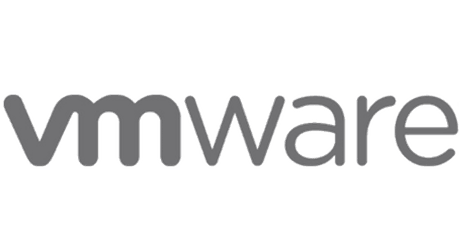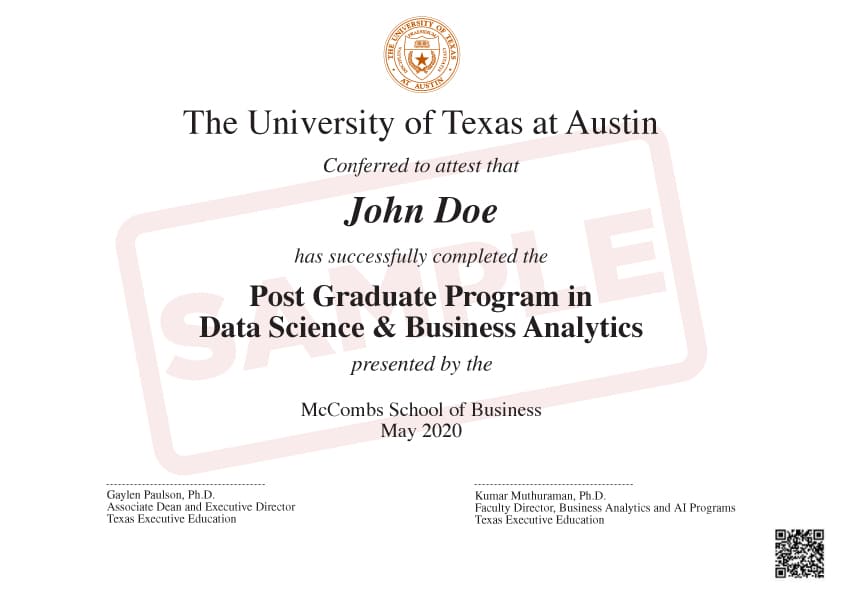
Post-Graduate Program in Data Science & Business Analytics
Advance your career with Data Science
With On-Campus Immersion in Decision Science and AI (Optional Paid Program)
- 6 Months Program
- Online Learning with Mentorship
 On-Campus Immersion in Decision Science and AI (Optional Paid Program)
On-Campus Immersion in Decision Science and AI (Optional Paid Program)
97%
Program Satisfaction

4.8/5
Trustpilot

4.81/5
Course Report
Thousands of Careers Transformed

Lakshmi Panchagnula
Water Programs Specialist
The program is a great introduction to programming and model building even for those without any background in coding.


Gabriel Arbe
Director of Operations, Latin America
Perfect combination of relevant content, flexibility, academic rigor, and practical content that allowed me to immediately put all into practice at work.


Aparna Bharath Kumar
Data Analyst
Great learning experience and would definitely recommend it to anyone who is looking for a perfect program.


Kati Laev
Customer Service Administrator
Gave me the confidence that I am at the same knowledge level in this course as those who have been working as a data scientist for years.


Osama Salem
Senior Application Manager
The course of DSBA helped me gain the skills, which I can use at my work.


Ndohnwi A Moma
Senior Consultant - Project Delivery Specialist
Was able to gain in depth knowledge even with no knowledge or experience in DSBA


Renato Barroco
Research Analyst / Independent Trader
The course helped me by giving a peek into whether I can make a move from Finance to Data Science


Sudarshan Murali
Senior Business Analyst Lead
This program helped me gain the right mix of technical and fundamental skills to be better at my role.


Naeem Sufi
Senior Webfocus Developer
I would recommend it to anyone interested in upgrading their skillset or starting a new career.

Get Industry ready with Career Support

1:1 Industry Interactions

Resume & Linkedin Profile Review

Interview Preparations & Demos

Online Portfolio Assessment
Why Choose Our Data Science Program
Global collaborations with peers
Meet other data science learners through micro classes and grow your professional network.
VIEW BATCH PROFILE
Weekend online mentorship by experts
Get assistance on 7+ industry-relevant projects through weekend sessions with a certified industry professional.
VIEW EXPERIENCE
Program Support
We help you stay motivated. Get personalised academic and non-academic support during the program.

Industry-relevant Projects & Skills
Learn in-depth Python, Machine Learning, Data Visualization and Ensemble Techniques.
VIEW CURRICULUM
Transform your career with Data Science and Business Analytics
Certificate from the University of Texas at Austin
Showcase your Certificate of completion from the University of Texas at Austin in your resume

#3 MS - Business Analytics, by QS World University rankings, 2022
#6 Executive Education - Custom Programs, Financial Times, 2022
For any feedback & queries regarding the program, please reach out to us at MSB-DSBA@mccombs.utexas.edu

#3
MS - Business Analytics

QS World University Rankings, 2022
#6
Executive Education - Custom Programs

Financial Times,
2022
Elevate Your Skills with On-Campus Immersion (Optional Paid Program)

Decision Science and AI Program
In the 3-day immersive on-campus program you can:
-

Connect with like-minded AI professionals.
-

Immerse in On-Campus Learning for 3 Days
-

Learn Leadership Skills
-

Create Intelligent Decision Science Systems
Reach out to your Program Advisor for more details
Comprehensive Curriculum
The curriculum has been designed by the faculty at McCombs School of Business at the University of Texas at Austin.
225+ hrs
Learning content
9+
Languages & Tools
The ‘Foundations’ module will empower you with the fundamentals of statistics, Python, and domain-specific business knowledge to set the foundations on which the rest of the course will be built. Every concept taught in this module will help you build a strong foundation that will stay with you forever. This is a light warm-up to the world of Data Science. By the end of this foundation course, you will be comfortable talking about Data Science terms.
- Basics of Programming
You will be introduced to programming concepts in this module. Programming is a set of instructions to a computer to perform specific tasks. - Introduction to Python
In this module, you will be introduced to the Python programming language and its fundamentals like syntax.
This module will teach some prerequisites before starting with the Data Science and Business Analytics online course like Programming concepts and Python.
 8 Case Studies
8 Case Studies
- Introduction to Python Programming
Python is a high-level, interpreted programming language, which is widely used by many businesses across the globe. It has a simple, easy-to-learn syntax that highlights code readability. In this module, you will work with Python syntax and execute your first code using vital Python fundamentals. - NumPy, Pandas
NumPy is a Python package for scientific computing like working with arrays, such as multidimensional array objects, derived objects (like masked arrays and matrices), etc. Pandas is a fast, powerful, flexible, and simple-to-use open-source library in Python to analyse and manipulate data. This module will give you a deep understanding of exploring data sets using Pandas and NumPy. - Exploratory Data Analysis
Exploratory Data Analysis, or EDA, is essentially a type of storytelling for statisticians. It allows us to uncover patterns and insights, often with visual methods, within data. This module will give you deep insights into EDA in Python and visualization tools. - Matplotlib, Seaborn
Matplotlib is a library to create statically animated, interactive visualizations, whereas Seaborn is a Matplotlib based data visualization library in Python. This module will give you a deep understanding of exploring data sets using Matplotlib and Seaborn.
 8 Case Studies
8 Case Studies
Build foundational skills for data analysis with Python, such as importing, reading, manipulating, and visualizing data. Python is a very vital language used across all domains.
 8 Case Studies
8 Case Studies
- Probability and Probability Distributions
Probability is a mathematical tool where you can study randomness, such as the likelihood of an event occurring in a random experiment. A statistical function where a random variable takes all the probable values and reports them within a specific range is called a Probability Distribution. This module will lecture you on Probability and Probability Distributions. You will also learn various types of Probability Distributions like Binomial, Poisson, and Normal Distribution. - Sampling Distribution and Central Limit Theorem
Sampling Distribution is statistical data acquired from numerous samples drawn from a specific population. Central Limit Theorem (CLT) is used to estimate a normal distribution. - Hypothesis Testing and Associated errors
Hypothesis Testing is a necessary Statistical Learning procedure for doing experiments based on the observed/surveyed data. This module will give you a deeper understanding of Hypothesis Testing and Associated Errors. - ANOVA and Chi-square test
Chi-Square is a Hypothesis testing method used in Statistics, where you can measure how a model compares to actual observed/surveyed data. Analysis of Variance, also known as ANOVA, is a statistical technique used in AI and ML. You can split observed variance data into various other components for further analysis and tests using ANOVA. This module will lecture you on identifying the significant differences between the means of two or more groups.
 8 Case Studies
8 Case Studies
Now that you have a hand on the technical jargon, we would also like to introduce you to Business Statistics and mathematical functions. We will help you understand the role of statistics in helping organizations take effective decisions, learn its most widely-used tools and learn to solve business problems using analysis, data interpretation and experiments.
- Essential Design Principles Of Tableau
Tableau is a data visualization tool that is widely used to solve problems. In this module, you will learn about Tableau and its essential design principles. - Creating Visualizations With Tableau
This module will guide you on how to create visualizations using Tableau on various data sources across domains. - Telling Stories With Visualization
In this module, you will learn how to create visualizations telling stories to draw everyone’s attention using creative ways. This session is a very interesting tutorial to the art of storytelling with data.
This tableau-focused module will help you develop mastery with Data Visualisation. Learn the fundamentals of communicating information efficiently to business users via information graphics. Learn to recognize visual characteristics of data, choose appropriate display mechanisms, and transform data into actionable insights through Data Visualization with Tableau.
The ‘Techniques’ module in this Data Analytics course will empower you with a thorough grounding in the most widely-used analytics and data science techniques so that you can approach any business problem with ease. By this time you have an overview of what is coming and can begin with mastering each technique.
 4 Case Studies
4 Case Studies
- Data Preparation for Modeling
Modeling is a technique to train your ML model for predicting labels from the features, tuning the model for business purposes, and validating it on holdout data. - Linear Regression - Simple Linear Regression, Multiple Linear Regression, Goodness of Fit, Measures of Regression Fit
Linear Regression is one of the most popular supervised ML algorithms used for predictive analysis, resulting in producing the best outcomes. You can use this technique to assume a linear relationship between the independent variable and the dependent variable. In this module, you will cover all Linear Regression concepts, such as Multiple Linear Regression, Goodness of Fit, and Measures of Regression Fit.
 4 Case Studies
4 Case Studies
Explore the fundamentals of Supervised Machine Learning, its key concepts and types. You will also learn how to pre-process data to prepare it for modeling.
 4 Case Studies
4 Case Studies
- Logistic Regression
Logistic Regression is also one of the most popular supervised ML algorithms, like Linear Regression. It is a simple classification algorithm where you can predict the categorical dependent variables with the assistance of independent variables. You will cover all the concepts of Logistic Regression in this module. - Decision Trees
A decision tree is a Supervised ML algorithm, which is used for both classification and regression problems. It is a hierarchical structure where internal nodes indicate the dataset features, branches represent the decision rules, and each leaf node indicates the result. You will cover all the concepts of Decision Trees in this module. - Evaluation of Classification Models, ROC and AUC
ROC (Receiver Operating Characteristic) curve is a graph, which displays a classification model’s performance at all classification thresholds. AUC (Area Under the ROC) curve is used to measure the entire two-dimensional area beneath the ROC curve. This module will lecture you on how to evaluate ROC and AUC curves.
 4 Case Studies
4 Case Studies
Learn the conceptual frameworks of building classification models for accurate prediction in business contexts through popular Machine Learning approaches such as Logistic Regression and Decision Trees.
 4 Case Studies
4 Case Studies
- Ensemble Methods - Bagging, Boosting and Stacking
In this module, you will learn various crucial Ensemble Methods like Bagging, Boosting, and Stacking. Here, you can enhance machine learning algorithms’ stability and accuracy, convert them into robust classification, etc. - Random Forest
Random Forest is a popular supervised ML algorithm. As the name reckons, it consists of various decision trees on the provided several subsets of datasets. Later, it calculates the average for enhancing the predictive accuracy of the dataset. Here, you will learn how to implement Random Forests in Machine Learning. - AdaBoost, GBM, XGM, XGBM
This module will give a deeper understanding of several boosting ensemble techniques like AdaBoost (Adaptive Boosting), GBM (Gradient Boosting Machine), XGM (Extreme Gradient Machine), and XGBM (Extreme Gradient Boosting Machine).
 4 Case Studies
4 Case Studies
We can now level up your skills by introducing Ensemble techniques. Ensemble methods help to improve the predictive performance of Machine Learning models. In the next module of this Data Analytics course, you will learn about Ensemble methods such as ‘Random Forest’ that combines several Machine Learning techniques into one predictive model to decrease variance, bias, or improve predictions.
 4 Case Studies
4 Case Studies
- Feature Engineering
Feature engineering is the process of transforming data from the raw state to a state where it becomes suitable for modeling. Here, you will learn various steps involved in Feature Engineering in this module. - Sampling and Smote, Regularization
Sampling is a process to retrieve information about the population predicated on statistics. SMOTE stands for Synthetic Minority Oversampling Technique, which helps you increase your dataset’s total cases in a balanced manner. Regularization is used to modify your ML models to prevent overfitting and create an optimal solution. You will cover all the fundamentals of Sampling, Smote, and Regularization. - Pipelining
This module will give you in-depth knowledge on automating your ML workflows using Pipelining. - Model Performance Measures
This module will lecture you on how to optimise the performance of your machine learning models with the help of model evaluation metrics.
 4 Case Studies
4 Case Studies
By this time in the program, you would be comfortable with models, We will now be learning to design and accentuate them. Model building is an iterative process. Employing Feature Engineering techniques, along with a careful model selection exercise, helps to improve the model. Further, tuning the model is an important step to arrive at the best possible result. This module talks about the steps and processes around these.
 4 Case Studies
4 Case Studies
- K-means Clustering
K-means clustering is a popular unsupervised ML algorithm, which is used for resolving the clustering problems in Machine Learning. Here, you will learn how the algorithm works and later implement it. This module will lecture you on the working of the algorithm and its implementation. - Hierarchical Clustering
Hierarchical Clustering is another popular unsupervised ML technique or algorithm, like K-means Clustering, which is used for building a hierarchy or tree-like structure of clusters. For example, you can combine a list of unlabeled datasets into a cluster in the hierarchical structure. You will get into the in-depth fundamentals of Hierarchical Clustering in this module.
 4 Case Studies
4 Case Studies
Unsupervised Learning finds hidden patterns or intrinsic structures in data. In this course, you will learn about commonly-used clustering techniques like K-Means Clustering and Hierarchical Clustering.
 1 Case Study
1 Case Study
- Introduction to Time Series
Time-Series Analysis consists of methods for analysing data on time-series, which is later used for extracting meaningful statistics and other relevant information. Time Series forecasting is used to predict future values based on previously observed/surveyed values. This module will introduce you to Time Series forecasting and its fundamentals. - Seasonality
Seasonality is a characteristic of a time series where the data experiences variations at regular intervals, such as weekly, monthly, or quarterly. Any predictable fluctuation or pattern that repeats over a period of one year is called Seasonal. - Decomposition
Decomposition is a forecasting technique that decomposes time series into several components. Later, it uses these components to create a forecast, which is more accurate than simple trend lines.
 1 Case Study
1 Case Study
Time Series Analysis is used for prediction problems that involve a time component. In this module, you will build foundational knowledge of Time Series Analysis in Python and its applications in business contexts.
This is a highly interesting module with lots of real life current examples, We will help you understand the grandeur of Data Science by taking you across several domains. The ‘Domain Exposure’ module of this Data Science and Business Analytics online course will provide a gateway to real-life problems from varied domains and teach you how to solve these problems using principles of data science and analytics.
- Overview of ChatGPT and OpenAI
- Timeline of NLP and Generative AI
- Frameworks for understanding ChatGPT and Generative AI
- Implications for work, business, and education
- Output modalities and limitations
- Business roles to leverage ChatGPT
- Prompt engineering for fine-tuning outputs
- Practical demonstration and bonus section on RLHF
Gain an understanding of what ChatGPT is and how it works, as well as delve into the implications of ChatGPT for work, business, and education. Additionally, learn about prompt engineering and how it can be used to fine-tune outputs for specific use cases.
 1 Case Study
1 Case Study
- Marketing and Retail Terminologies: Review
Marketing analytics measures, manages, and analyses marketing performance for enhancing the effectiveness and optimisation of return on investment. Retail analytics analyses business trends and performance on inventory levels, supply chain movement, consumer demand, sales, etc. This module will teach you how to analyse a business’s performance using data science and business analytics. - Customer Analytics
Customer Analytics analyses how customers help make crucial business decisions through predictive analytics, data visualisation, information management, and segmentation. - Retail Dashboards
Retail Dashboard is a tool that is used to track your business’s performance in sales and marketing. This module will lecture you on how to work with the means to track the insights. - Customer Churn
Customer Churn is the percentage of customers/clients who stopped doing business with the products and services of a company over a certain period. In this module, you will grasp how to track the analysis of the customers who stopped doing business with you. - Association Rules Mining
Association Rules Mining in Data Mining is a method that identifies relationships amongst variables in large sets of databases. This module will give you a deeper understanding of how to identify patterns amongst variables.
 1 Case Study
1 Case Study
Learn the applications of data analytics to Marketing and Retail. Understand how marketing analytics can be utilized to further marketing objectives and measure, improve, and predict performance.
 1 Case Study
1 Case Study
- Web Analytics: Understanding the Metrics
Web Analytics is the computation of your Internet data by collecting, analyzing, and reporting it to optimize and improve your web pages. You will understand how to optimize your data on web pages in this module. - Basic & Advanced Web Metrics
This module will lecture you on tracking the performance and statistics to improve a website’s performance from fundamental to advanced methods. - Google Analytics: Demo & Hands-on
Google Analytics is one of the most useful analytics tools in the Data Analytics industry, helping you track website traffic. As everyone most widely uses the Google search engine, most companies use Google analytics as their Web Analytics service to analyse their website traffic and performance. In this module, you will gain knowledge of working with Google Analytics using hands-on demos. - Text Mining
This module will lecture you on converting an unstructured text into a structured text to discover meaningful insights. This method is called Text Data Mining.
 1 Case Study
1 Case Study
Learn how the data collected from websites and social media can be used to make business decisions through different types of web and social media analytics. This is a very interesting module that takes you through the world of hashtags and data.
 1 Case Study
1 Case Study
- Introduction to Supply Chain
As the name reckons, the supply chain is a network between a company and the suppliers of the company to distribute a product to the final customer/buyer. In this module, you will learn how the network works in the supply chain. - Demand Uncertainty
Demand uncertainty occurs when a company cannot accurately predict customers’ demands for its products and services. It causes several problems for your company. - Inventory Control & Management
Inventory control is a technique that controls and maximizes inventory in the warehouses of a company. Inventory management is an approach for tracking your inventory of sourcing, buying, and selling of goods. - Inventory Classification Methods
As the name implied, Inventory classification categorizes your goods in an inventory system as per their demands, revenues, supply, etc. - Procurement Analytics
Procurement analytics uses quantitative methods for obtaining actionable insights and outcomes from data. - Inventory Modeling (Reorder Point, Safety Stock)
Inventory Modelling is a mathematical model that determines the most agreeable level of inventories in a company. This module will help you maintain inventory in the production, manage the stock frequency, quality control, etc. - Advanced Forecasting Methods
This module will give you a deeper understanding of the working of advanced forecasting methods. Also, you will learn how to apply these methods in supply chain management and logistics analytics.
 1 Case Study
1 Case Study
Learn how supply chain analytics can help businesses predict future demand, decide on inventory, understand customer needs, and optimise business costs.
 1 Case Study
1 Case Study
- Why Credit Risk-Using a Market Case Study
Credit Risk occurs when a borrower fails to repay any debts or loans. This module will lecture you on managing credit risk. - Comparison of Credit Risk Models
This module will get you comfortable with all the critical comparisons of several credit risk models. - Overview of Probability of Default (PD) Modeling
Probability of Default (PD) Modeling provides an estimation of the likelihood that a borrower cannot meet its debt responsibilities. - Fraud Detection
Fraud detection is a set of processes that deals with the prevention of money or property from being acquired through false claims. This module will help you in detecting fraud in a company. - PD Models, Types of Models, Steps to Making a Good Model
This module will teach you about the PD model and several other models that are available. You will also understand the procedure to make a good model. - Market Risk
Market Risk occurs when an investor faces losses because of some external factors affecting the market prices. This module will lecture you about market risk management. - Value at Risk - Using Stock Case Study Project
Value at Risk (VaR) is a statistical method to measure the financial risk of a company over a certain period. In this module, you will implement VaR using the Stock Case Study Project.
 1 Case Study
1 Case Study
As we conclude the program, we introduce you to one of the most important applications of Data Science- finance. In the last module of this Data Science and Business Analytics online course, you will learn the applications of data analytics in Finance and Risk Management, such as fraud detection, credit risk, probability of default modeling, etc.
This post-graduate program on Data Science and Business Analytics online certification course will assist you through your career path to building your professional resume and reviewing your Linkedin profile. The program will also conduct mock interviews to boost your confidence and nurture you nailing your professional interviews. The program will also assist you with one-on-one mentorship, designing your ePortfolio with industry experts, and guiding you through a career fair.
Earn a Postgraduate Certificate in the top-rated Data Science and Business Analytics online course from the University of Texas, Austin. The course’s comprehensive Curriculum will foster you into a highly-skilled professional in Data Science and Business Analytics. It will help you land a job at the world’s leading corporations.
The Decision Science and AI is a 3-day on-campus Program that presents a valuable opportunity to explore AI use cases and become a driving force behind AI-driven initiatives within your organization. It comprises of dynamic discussions, collaboration with like-minded professionals, and engaging networking sessions hosted at the prestigious University of Texas at Austin.
- Welcome & Program Orientation
- Introduction to Decision Sciences & AI
- Campus Tour & Group Photo
- Introduction to Dynamic Programming
- Programming an AI agent to Play a Variant of Blackjack
- Introduction to Reinforcement Learning
- Programming an AI Agent that learns by itself to play computer games
- Session with Industry Mentor
- The Art and Science of Negotiations
- Project Brief and Active group work
- Group work on Project
- Certifications and Photo Ops
Languages and Tools covered


Hands-on Projects
Data sets from the industry

1000+
Projects completed
22+
Domains

Marketing

Social Media

Social + Healthcare

Insurance

Retail

Banking

HR

Insurance
Our Faculty and Mentors
Learn from leading academicians in the field of Data Science and Engineering and several experienced industry practitioners from top organisations.
20+
Professors
2500+
Industry Mentors

Dr. Kumar Muthuraman
Faculty Director, Centre for Research and Analytics


Dr. Abhinanda Sarkar
Faculty Director, Great Learning


Prof. Raghavshyam Ramamurthy
Industry Expert in Visualization


Mr. R Vivekanand
Operations Director

Industry Mentors from Top Organisations

Prabhat Bhattarai
Data Scientist


Nikhila Kambalapalli
Consultant, Data Science


Srihari Nagarajan
Senior Data Scientist


Olayinka Fadahunsi
Head of Data Science and Engineering


Bridget
Senior Machine Learning Engineer


Anis Sharafoddini
Data Scientist Lead


Avinash Ramyead
Senior Quantitative UX Researcher / Data Scientist / Behavioral Scientist in Video ML


Edward Krueger
Principal Data Scientist and Proprietor


Paolo Esquivel
Senior Data Scientist


Michael Keith
Analytics Manager


Mohit Jain
Principal Data Scientist

Learner Testimonials
I've done a program before with a different university and I didn't feel there was as much interaction as I would have loved. So I identified a few things, such as mentoring sessions, which you do with an expert from the business and that allows you to interact as if you were on campus.
Aziz Elbahri
Manager, Customer Care Administration, American Airlines (United States)

It's very compact, but at the same time it covers everything with a real-world domain context behind each of the problem statements, and in doing so, they provide you with all the collateral materials to help you in your journey.
Yuedong Lu
Director Client Partnership & Growth, Fractal Analytics (United States)

The advantage of learning it on your own is that you can start and stop. I liked that aspect of it where I could control how I digested the lectures.
Sarah Bittner
Patent Agent, Montgomery McCracken Walker & Rhoads LLP (United States)

The most helpful features of the program are the mentor sessions and the solo projects. It felt like you put everything together and put it in a business case, and that was very helpful for me.
Monica Suarez
Former Founder, Arewa (United States)

My two biggest achievements of my life have been my son and then Great Learning. The program has been amazing and everyone from the program office, faculties to mentors were very supportive and helped me achieve my professional and personal goals.
Shamelle Chotoki
GSI Analyst, Western Union (United States)

This program is a great start for any individual irrespective of your profession or your comfort level in programming. All the video lectures, the mentored learning sessions, the assignments, the projects, everything will give you a lot of confidence to build a career in Data Science.
Indu Chanchal Polpaya
Postdoctoral Research Associate, Lehigh University (United States)

I loved the course because it really just stretched me into a whole new world. I was really happy with my results in the course and that was really thanks to the amazing mentors and lecturers and of course the program management.
Leanne Da Cerca
Senior Group Manager, MTN (South Africa)

What Heena [Program Manager] give us, especially to me, is the support that I didn’t receive from any other online courses. I appreciate the constant messaging and constant checking on us, how’s our progress or any other concerns that we need to raise.
Fermar B Talosig
Senior Associate Engineer, NetLink Trust (Singapore)

If you are interested in learning the Data Science and Business Analytics course in your own time and at your own pace, this is a great program. I recommend this because it is a course which is starting from the basics and then laying brick-by-brick to get to the final data insights.
Sudha Aluri
Shared Information Support Manager, Freddie Mac (United States)

I like the structure of the program as it combines all the theories, practices and case studies together. This program is highly recommended as it gives you the tools to address problem solving in a efficient manner.
Flor de María Gómez Esparza
Ex-Compensation Leader, Pemex (México)

The way you have been explaining, clearing doubts wherever possible and even encouraging, I must say that you've really done well and I want to say that I celebrate you. Thank you so much for giving your time to teach and help us in this journey.
Moeti Manoto
Service Manager, Openserve (South Africa)

In the hackathon in this program, first thing is, I have learned speed. From the same dataset different models, trying that was a new thing.
Sruthi Boojala
Software Engineer, TEKsystems Global Services India Pvt. Ltd (Singapore)

The most important thing what I thought from this program is this is a very good combination of Data Science and Business Analytics. Every week we will be having a quiz, based on the topic that we covered, which is a rigorous learning process. So this actually is very helpful to learn and get in touch.
Mohammad Tahmid Bari
Data Analyst II, Expeditors Singapore Pte Ltd. (Bangladesh)

It was a pleasure to deal with all of you, right from the coordinators to the mentors. Special thanks to the doctors who have given valued information about Data Science and Business Analytics.
Mohamed Shafik Sabry
Solution Architect, GBM - IBM (United Arab Emirates)

Thank you for how you tried to impart knowledge to us. Thank you for all the time you spend, the resources, the efforts you put into ensuring we have a full grasp of everything you pass across to us, you are truly appreciated.
Seun Lawal Anako
Senior Manager, Business Compliance, American Tower Company (Nigeria)

It's quite interesting because I can see my performance and also other's performances. The competition is some kind of motivation for me to work better and to see whether I can beat the others.
Low Yu Ning
Product Engineer, Micron Semiconductor (Singapore)

It's quite motivating to see the name on the leaderboard in the hackathon. Don't try to think too much about the model, think about the data. Data cleanup and understanding the data is the most important thing.
Sharat Kishore
Training & Development- Technical Instructor, Schlumberger (UAE)

Learner Feedback on Mentorship and PM Support
Great Learning is an excellent online platform to pursue your dream career. As a Data Science aspirant, learning and implementing the modules in real-world scenarios is the first and foremost challenge. The concepts are taught by world-class faculties and industry experts who guide and support the journey. Flexible timings, hands-on projects, a well-designed curriculum, mentor support, and more open up a plethora of opportunities.
READ MOREThe PG program for Data Science and Business Analytics was an amazing experience. I was thoroughly engaged throughout the program and found the support system provided by my mentor and program manager to be exceptional. As a working professional, I appreciated the well-structured nature of the program, which allowed me to balance my work and learning commitments effectively.
READ MOREI want to express my sincere appreciation to the faculty members who simplified complex topics and delivered lectures almost effortlessly. I would also like to thank my peers and program manager for this experience, which broadened and sharpened my knowledge as a budding data scientist. Overall, I have learned a lot from this program and highly recommend it to others seeking to enhance their skills.
READ MOREI’m glad I chose the right path by joining Great Learning. This being a completely new field, I was a bit worried at the initial phase. But the coordinators were supportive and the mentors were brilliant. The program was very well-structured for a working professional and highly effective. The assignments and projects were really helpful and bridged the gap between theoretical and industry knowledge. I would like to recommend most people like me to start their careers and upskill themselves in the AI/ML field from Great Learning.
READ MOREThe program has been designed to create a smooth learning rhythm that is easy to adapt with working professionals. The PGP in DSBA is designed with great learning support, academic rigour and upto date comprehensive curriculum covering the latest used tools and techniques in the industry to make you a professional data scientist. The best part is this program provides an opportunity to apply the skills and knowledge acquired in real-time every week through mentored learning sessions, graded quizzes and hands-on projects.
READ MOREI am really happy with the program and its outcome. Throughout my learning journey, I received great support from the Great Learning staff. I would also like to thank my mentors for the quality real-life knowledge they provided me with. Lastly, their learning platform Olympus was very easy to navigate through and had a clean UI.
READ MOREThroughout the program, I received good guidance and a comprehensive overview of the subject matter. The quizzes and projects were engaging, igniting a strong interest in further exploration. My key takeaways from the program include a solid understanding of Python, business statistics, and new topics like machine learning and artificial intelligence. These skills have equipped me with the ability to make structured predictions and conduct data analyses, greatly benefiting my work in the field of computational catalysis.
READ MOREGreat learning has a well-rounded approach that has worked well for me. The support system is amazing. Kudos to my Program Manager for being such a perfect cheerleader. Also, their instructors deliver complex topics in the most simple way possible. I really liked the practical projects as they teach you a lot about how real-world businesses work.
READ MOREIt was a wonderful learning experience. My mentor, Akansha Agrawal was amazing. She explained all the topics nicely and her pace of teaching was perfect. My Program Manager was extremely cooperative and understanding. She provided me with the required extensions so that I could complete the projects and continue with further modules.
READ MOREThe program was very useful and made me learn a lot of new things. The lectures and live sessions not only provided theoretical knowledge but provided real-life insights. The presentation style was very good and all our doubts were resolved in a detailed manner.
READ MOREIt was an amazing experience. I learned a lot. Davanshi was amazing supporting and cheering me through the process. She helped a lot with the structure of the program. I like the way this business analytics program is set up. The lectures and videos were very nicely explained. They made it look simple with logic that helped me digest the content. Thanks a lot!
READ MOREI acquired proficiency in data science and Python through a comprehensive self-learning journey. The course provided exceptional study materials and recorded lectures, maintaining consistently high standards throughout. I would like to express my gratitude to the program manager for their diligent follow-ups, ensuring that all projects and assignments were submitted promptly. Thank you.
READ MOREThe data science course is well designed, It helps us clear the fundamentals and has extensive problem statements to solve. It would be great to see more industry/real life implemented applications and cases ML and Data science projects.
READ MOREThis program has been great. I had no experience at all with python or any other programming language; now I am able to manipulate data using python and draw insight from it.
READ MOREThis data science program is exactly what l needed in order to move forward in my career. The content is very good for who need to transition into a new career and the hands-on projects are geared toward making one feel how real world projects are like.
READ MOREProgram Fees
Program Fees:
3,800 USD
Upfront Payment & Referral
3,600 USD
3,650 USD
Payment Partners





*Subject to partner approval based on regions & eligibility. dLocal for Brazil, Colombia & Mexico learners. Other partners for U.S. learners only.
Benefits of learning from us
- High-quality content
- 7+ hands-on projects
- Live mentored learning in micro classes
- Doubt solving by industry experts
- Live webinars by UT Austin faculty
- Career support services
I'm extremely glad I signed up for the program. I definitely got what I wanted from the program and strongly recommend it.

Javier R. Olaechea
Data Solution Integration Advisor ExxonMobil
Plans Full fee
payment plan
Monthly Installment
| Installments | Starts at |
|---|---|
| 6 months | 634 USD/month |
| 12 months | 317 USD/month |
Total Fee Payment
3800 USD
Application Process
Fill the application form
Apply by filling a simple online application form.
Interview Process
Go through a screening call with the Admission Director’s office.
Join program
An offer letter will be rolled out to the select few candidates. Secure your seat by paying the admission fee.
Upcoming Application Deadline
Admissions are closed once the requisite number of participants enroll for the upcoming cohort . Apply early to secure your seat.
Deadline: 14th Mar 2024
Apply Now
Reach out to us
We hope you had a good experience with us. If you haven’t received a satisfactory response to your queries or have any other issue to address, please email us at
help@mygreatlearning.comBatch Start Dates
USA & Canada
16th Mar 2024
All other regions
16th Mar 2024
Frequently Asked Questions
- Personalised mentored learning in small groups of up to 15 learners
- Covers industry-relevant topics in depth, with hands-on applications and case studies
- Provides hands-on exposure to tools such as Python, Tableau and Advanced Excel. Datasets are also provided
- Experiential learning projects at the end of every module enable candidates to apply their learning to real-world business problems
- Interactive live sessions with industry experts and mentors provide current industry knowledge and insights
- The online delivery model makes it convenient for working professionals to pace their learning and get doubts cleared without having to quit their jobs or travel anywhere
The PGP-DSBA curriculum has been designed in collaboration with UT Austin. The teaching and content in the program is by faculty from UT Austin, Great Learning and other practicing data scientists and analytics experts. The capstone projects are approved by UT Austin Faculty.
Upon successful completion, participants earn a certificate of completion from The University of Texas at Austin.
Participants are guided through a unique mentored learning process that happens in a micro-class of 20-22 learners, and guided by a senior industry mentor. These are live sessions with two-way audio and video interaction and take place on weekends.
The primary objective of the program is to help you prepare for a career in the domain. Understanding the importance of gaining credibility, knowledge, and a body of work in landing you a job, we have worked backwards to design a program that helps you stand out on all 4 fronts.
- The certificate from UT Austin serves to give you credibility and recognition in the global industry.
- Best-in-class recorded content from UT Austin faculty and hands-on practical training equip you with the knowledge to succeed.
- The projects you complete add on to your body of work to prepare an industry-ready portfolio by the end of the program.
- Interacting with established practitioners and other aspiring data science professionals helps you build your network.
In addition, the program provides career guidance sessions with industry practitioners and mentoring/support on the softer aspects of job hunting such as resume review, LinkedIn profile review, interview preparation, etc.
Yes. The program is covered using recorded content delivered by academic and industry faculty and live instructor-led online micro-classes which happens in a group of 20-22 learners. All assessments will also be conducted online.
Candidates can access all the necessary learning material online through the Learning Management System.
Participants do several experiential projects on Time series forecasting, Predictive modeling, Advanced statistics, Estimation & Hypothesis testing, and Data mining, which requires candidates to use and apply the concepts learned across all the different modules in these projects.
- Python
- Tableau
The McCombs School of Business at the University of Texas at Austin is ranked No. 6 in the world by QS Business Analytics Ranking, 2021.
The projects include real-world projects and case studies. You'll work on data analysis, predictive modelling, machine learning, and more, utilizing tools like Python, R, and Tableau, providing a practical understanding of the concepts.
Yes. This program is often considered one of the best Business Analyst courses for those looking to change or advance their careers. Its comprehensive curriculum, industry-aligned projects, and connection with top-tier faculty make it suitable for those new to the field or seeking to upgrade their existing skills.
Graduates of this course can explore career opportunities in various domains such as finance, healthcare, retail, technology, and more. Typical roles include Data Analyst, Business Analyst, Data Scientist, and Business Intelligence Specialist. The program's strong reputation and industry connections significantly enhance job prospects.
Yes. Participants will have the opportunity to interact with UT Austin faculty. Regular classes, Q&A sessions, and one-on-one mentorship opportunities ensure an engaging learning experience.
The business analyst course combines online sessions, tutorials, hands-on projects, mentorship from industry experts, and career support. This blended approach ensures both theoretical understanding and practical application of data science and business analytics skills. In addition, there is an optional 6-week module that covers Microsoft Power BI, where learners can master the tool for data analysis.
A business analyst course is a structured educational program designed to teach individuals the skills, knowledge, and techniques required to become effective business analysts. These courses focus on various aspects of business analysis, including requirements gathering, process modelling, data analysis, and communication with stakeholders. Participants learn how to identify business needs, analyze and interpret data, and propose solutions to improve the efficiency and effectiveness of business operations.
The curriculum typically covers topics such as:
-
Introduction to business analysis: This includes understanding the role and responsibilities of a business analyst, as well as the importance of business analysis in organizations.
-
Requirements elicitation and management: Participants learn various techniques for gathering, documenting, and validating business requirements from stakeholders.
-
Business process modelling: This involves the use of diagrams and flowcharts to represent and analyze business processes, identifying areas for improvement.
-
Data analysis and interpretation: Students learn to analyze and interpret data using tools and techniques such as spreadsheets, databases, and data visualization software.
-
Solution evaluation and validation: This includes assessing the feasibility and effectiveness of proposed solutions, as well as validating them against the original requirements.
-
Communication and stakeholder management: Participants develop the ability to effectively communicate with various stakeholders, including managers, team members, and clients.
-
Tools and techniques: Students are exposed to different business analysis tools and methodologies, such as SWOT analysis, PESTLE analysis, and Agile methodologies.
Business analyst courses can be found in various formats, such as online or in-person classes, part-time or full-time programs, and short-term workshops or long-term certification courses.
Each week involves around 2-3 hours of recorded lectures and an additional 2-hour mentored learning session each weekend, which includes hands-on practical applications and problem-solving. The program also involves around an hour of practice exercises or assessments each week. Additionally, based on your background, you should expect to invest 2 to 4 hours every week in self-study and practice. So, that amounts to a time commitment of 8-10 hours per week.
The Post Graduate Program in Data Science and Business Analytics is an online professional certificate program offered by the McCombs School of Business in collaboration with Great Learning. You will receive the grade sheet post-completion; however, the program does not carry any credits. Also, your performance will be assessed through individual assessments and module completion to determine your eligibility for the certificate.
Upon completing all the modules in accordance with the qualifying requirements for the program, you'll receive a certificate from the University of Texas at Austin.
PGP-DSBA is mostly pursued by working professionals planning to make a career transition into analytics roles. We also have students in their final year of graduation benefiting from the program. Graduation in a quantitative discipline like engineering, mathematics, sciences, statistics, economics, etc, would help participants get the most out of PGP-DSBA program.
Data has become highly influential. Data is the future. The domain of Data Science is already observed to create wonders for most of the industries it is being applied to. Data Scientists are creating a significant impact and are causing a great revolution.
The scope of Data Science is far-reaching. The demand and need for data scientists are increasing exponentially as days pass by. This demand is rising at a rapid pace and is expected to grow even more in the future. Hence many professionals are seeking a career transition into the field of Data Science.
Business Analytics is another exciting technological domain that has gained utmost popularity in recent times. Business Analytics and Data Science are employed together for the best outcomes.
The technologies of Data Science And Business Analytics are also believed to take over most of the existing job roles. Hence to build a secured career taking up a data science and business analytics course has become a reliable choice. The applications of data science are delivering the most accurate and reliable results. Data Science and business analytics are also applied in solving most complex business problems.
The applications of Data Science are already being applied to many fields such as gaming, robotics, healthcare, marketing, finance, and more. Data Science and Business Analytics are assumed to extend their territories to several other fields and build new dynamics.
These domains also offer one of the highest-paid job roles across the globe. Hence, choose the best data science and Business analytics certificate courses to fit into the best job roles of the 21st century.
The job opportunities in this field are captivating, attracting both young professionals and career changers to pursue a career as Data Scientists or Business Analysts. Online courses in Data Science and Business Analytics have become popular among those seeking to upskill and enter this rapidly growing industry.
Let us look into a few of the major job positions of Data Science and Business Analytics.
1. Data Analyst
2. Data Architect
3. Statistician
4. Business Analyst
5. Database Administrator
6. Data Engineer
7. Data Scientist
Pursuing a data science and analytics course would aid you get into one of the above-mentioned job roles.
Many believe that Data Science and Business Analytics are the same. Many also use these terms interchangeably. Below are a few differences between Data Science and Business Analytics. These two domains when combined together perform wonders. Hence many are desiring to pursue a Data Science and Business Analytics online course.
- Data Science is the fundamental application of various machine learning methods and ideas to derive significant insights from raw data while Business analytics deals with the collection of data and evaluates the collected data towards accomplishing the business goals.
- Data Science focuses on problem-solving whereas Business Analytics focuses on decision making.
- Data Scientists strives to find the reason for driving those trends and Business Analysts aims to discover the trends of the data
- Data Science applies a lot of coding practices while Business Analytics does not demand programming skills.
- Data Science implements algorithms, statistics to derive insights from data and Business analytics employs the statistical analysis of structured data.
- The ultimate agenda of Data Science is to pose questions and understand the analyzed collected data whereas Business Analytics renders reliable solutions to specific business problems.
Learn more about these technologies by taking up a data Science and business analyst course online.
Data analytics is another interesting domain that is driving interest in many to pursue data analytics courses. Data Science and Data Analytics are two different terms as well as domains that are often referred to as one. Nevertheless, there exists a lot of differences between these two terms. If you are keen about pursuing a data analytics course, it is crucial to learn the differences between Data Science and Data Analytics.
Below are the differences between Data Science and Data Analytics.
- Data Science is the integral application of several machine learning techniques and concepts to extract meaningful insights from raw data and Data Analytics refers to the analysis and classification of the patterns of the information collected to derive the best conclusions that aids in meeting business goals.
- Data science detects patterns in the existing data while Data Analytics is used to sort data to fulfill the organizational needs.
- Data Science has a macro-level scope. However, the scope of Data Analytics is micro.
- The ultimate agenda of Data Science is to ask questions whereas Data Analytics aims to find the perfect and actionable data.
- Data Science focuses on problem-solving while Data Analytics concentrates on decision making
- Data Science exercises Mathematics, Statistics, and Programming Skills. But, Data Analytics applies qualitative and quantitative techniques.
- Data science is implemented in technological domains such as Artificial Intelligence, Machine Learning, and many more while Data analytics is applied in e-commerce, gaming, and other sectors to resolve the issues associated with data.
- Data Science predicts the future whereas Data Analytics provides a day-to-day analysis of the data.
The domain of Data Science is applied in many industries.The applications of Data Science and Business Analytics are not limited to the IT sector. Hence, many are seeking the best business analytics courses online to get into the most exciting job roles. We all are witnessing the hand of data science which we never knew.
Below are a few of the applications of Data Science and Business Analytics offered to different domains
1. Internet Search
Data Science and Business Analytics plays a vital role in displaying the most accurate results for internet search queries. Data Science is an integral technology used by most search engines such as google, bing, opera, and more.
2.Speech Recognition
One of the applications of Data Science is speech recognition. Data Science and Business Analytics are employed to understand the voice notes and produce accurate outcomes. Siri, Alexa, Google voice assistant, and more are a few examples that exercise data science to regulate speech recognition services.
3. Targeted Advertising
Data Science promotes target advertising. Data science algorithms are rapidly employed in digital marketing to identify the target audience and advertise accordingly. Data Science and Business Analytics plays a major role in increasing the CTR( call through rate). These targets are made by studying the user's past behavior patterns.
4. Recommendations
Data Science is employed to make the best recommendations of the products and services of the e commerce websites. Amazon, Flipkart, Spotify, Netflix, and more employ data science to show the best recommendations to its users. This enhances the user's experience as they encounter a personalized shopping experience.
Out of the many, below are a few attributes of Data Science that make it the best technological domain to work for.
1. Data Science and Business Analytics are high in demand
Data Science and Business Analytics are the two domains which have got a great demand. Even as many industries are adapting Data Science and Business Analytics at a rapid pace, there is a significant rise in demand for these technologies.
2. Offers highest-paid career roles
The job roles offered in these domains are considered highly prestigious. These job roles are also observed to be one of the highest-paid ones across the country and abroad.
3. A huge scope
Data Science and Business Analytics are technologies that are not limited to the IT sector. Data Science and Business Analytics have been embraced by most industries such as Healthcare, Gaming, Social Media, Digital Marketing, Agriculture, and many more.
4. The most secure domains.
Even as we live in a world where technological upgrades happen every single day, Data Science and Business Analytics offers secured job roles. Data Science and Business Analytics are expected to take over many of the existing job roles. Hence it is crucial to consider a career that stands tall and secured. Data Science and Business Analytics are surely the domains that offer the most secured job roles.
There are a lot of industries that are already employing Data Science and Business Analytics for the unbelievable benefits they offer. The list of the industries/ domains adapting Data Science and Business Analytics is increasing rapidly. Considering this, the demand for Data Science and Business Analyst online courses is increasing day by day as many are aspiring to get into these job roles.
Business
Data Science and Business Analytics are employed to derive the best business solutions and solve complex business problems. Data Science and Business Analytics are rapidly being applied in businesses as they are observed to serve great benefits such as predict the most accurate outcomes, assessing business decisions, formulating effective business strategies, leveraging the data, and more.
Agriculture
Data Science and Business Analytics are assisting the farmers by offering them many benefits such as weather prediction, analyzing the soil, pest control, disease detection, recommendation of the best fertilizers, and more.
Gaming Industry
Data Science and Business Analytics are applied in designing games. These technologies are helping the designers in designing the games that keep the user engaged and enthusiastic. The data science algorithms study the user's moves and give a tough competition which makes the game more exciting.
Robotics
Data Science and Business Analytics are employed in designing robots. The tools and techniques of Data Science and Business Analytics are applied to create the most intelligent robots. As Data Science is used in Artificial Intelligence and Machine Learning, it stands in the gap to design many technological innovations.
Apart from the above-mentioned industries, these technologies are also used in many other industries such as E commerce, the financial sector, education, and more.
A data analytics course helps students gather, process, analyze, and understand data to gain insights to help them make better decisions. This course covers various aspects of data analytics, such as predictive modelling, statistical analysis, and data visualization. Data analytics courses commonly cover the following subjects:
-
Data cleaning, managing missing data, and data transformation methods are all part of data exploration and preprocessing.
-
Basics of probability distributions, hypothesis testing, and descriptive and inferential statistics comprise statistical analysis.
-
Data representation in graphs, charts, and other visual forms.
-
Introduction to supervised and unsupervised learning methods, model assessment, and model optimization in machine learning.
Data analytics courses are offered in various forms, such as online or in-person classes, part-time or full-time programs, and short-term workshops or longer certification courses. Upon completion, participants can apply these skills across various industries, such as marketing, finance, healthcare, and more.
Please note that submitting the admission fee does constitute enrolling in the program and the below cancellation penalties will be applied:
1) Full refund can only be issued within 48 hours of enrollment
2) Admission Fee - If cancellation is requested after 48 hours of enrollment, the admission fee will not be refunded.
3) Fee paid in excess of the admission fee:
-
Refund or dropout requests requested more than 4 weeks before the Commencement Date are eligible for a full refund of the amount paid in excess of the admission fee
-
Refund or dropout requests requested more than 2 weeks before the Commencement Date are eligible for a 75% refund of the amount paid in excess of the admission fee
-
Refund or dropout requests requested more than 24 hours before the Commencement Date are eligible for a 50% refund of the amount paid in excess of the admission fee
-
Requests received after the Commencement Date are not eligible for a refund.
-
Cancellation must be requested in writing to the program office.
Related Programs for you
Still have queries? Contact Us
Please fill in the form and an expert from the admissions office will call you in the next 4 working hours. You can also reach out to us at dsba.utaustin@mygreatlearning.com or +1 512 793 9938
Download Brochure
Check out the program and fee details in our brochure
Oops!! Something went wrong, Please try again.
We are allocating a suitable domain expert to help you out with your queries. Expect to receive a call in the next 4 hours.
Not able to view the brochure?
View Brochure













